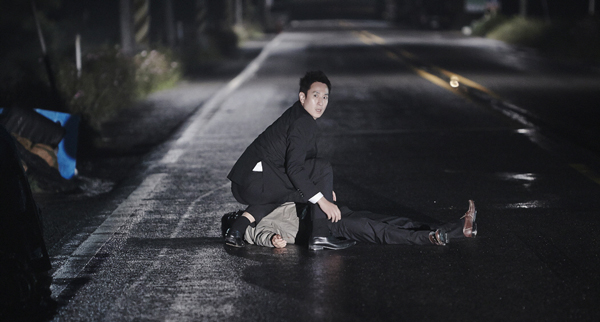![]() To say that homicide detective Gun-soo (Lee Sun-kyun) isn’t having a great day would be an understatement. Here’s what happens to him over the course of 24 hours. Gun-soo has to bury his recently deceased mother on the same day he receives divorce papers from his ex-wife. He’s called away from his mother’s funeral by one of his colleagues, who tells him that the internal affairs boys have raided their office, suspecting Gun-soo and his partners of taking payoffs. Worse, they’ve busted open Gun-soo’s desk drawers and found loads of kickback cash inside. As he’s on his way to the station—a little tipsy from the funeral—he swerves to avoid a dog on the road. Unfortunately, he ends up hitting a man.
To say that homicide detective Gun-soo (Lee Sun-kyun) isn’t having a great day would be an understatement. Here’s what happens to him over the course of 24 hours. Gun-soo has to bury his recently deceased mother on the same day he receives divorce papers from his ex-wife. He’s called away from his mother’s funeral by one of his colleagues, who tells him that the internal affairs boys have raided their office, suspecting Gun-soo and his partners of taking payoffs. Worse, they’ve busted open Gun-soo’s desk drawers and found loads of kickback cash inside. As he’s on his way to the station—a little tipsy from the funeral—he swerves to avoid a dog on the road. Unfortunately, he ends up hitting a man.
Checking the victim’s pulse, Gun-soo sees to his horror that the man’s dead. Not wanting to have to deal with the consequences, he wraps up the body and tosses it in his trunk. After tangling with officers at a DUI checkpoint, he makes it to the station, where he argues with his colleagues, who want him to take the fall for the rest of them, which of course he refuses to do. Afterward—in a great MacGyver-like scene—he ingeniously finds a resting place for the dead guy’s body, with no one the wiser. Gun-soo thinks he’s in the clear after this, but this bad night is only the beginning of his troubles.
Gun-soo’s the hero (kind of) of writer-director Kim Seong-hun’s brilliant and expertly conceived noir A Hard Day. Actually, he’s the hero only by default, because he’s somewhat less of a scumbag than some of the other characters in the film, especially his main antagonist. What makes this such a great, even revelatory work is how deftly Kim takes standard-issue, even cliché, Korean film elements—a car accident, crooked cops, a funeral with wailing mourners—and transforms them into an exciting, continually surprising, and bracingly fresh thriller. The labyrinthine, yet always crystal clear, plotting ratchets up the tension and turns the screws ever tighter on its protagonist as he must come up with a way to escape ever stickier predicaments. This puts the viewer in the ethically complicated position of rooting for a character who’s deeply flawed, to say the very least.
Gun-soo soon encounters a formidable opponent in the person of Lieutenant Park Chang-min (Cho Jin-woong). If Gun-soo is simply your run-of-the-mill corrupt cop, then Chang-min is full-on gangster; his police uniform is the only thing separating him from the thugs and lowlifes he regularly does business with. The conflict between the two men eventually leads to the sort of knock-down, drag-out confrontation that is very common in Korean action films, and unsurprisingly, quite brutal.
But what elevates Hard Day above the standard Korean crime film is that the suspense and thrills don’t depend on gory violence or extreme hyperactivity but on ingeniously plotted situations that test everyone’s resourcefulness and mettle. This is no doubt what impressed audiences when A Hard Day premiered at the 2014 Directors’ Fortnight at Cannes. And it’s not only the plotting that distinguishes the film; Mok Young-jin’s moody, propulsive score and Kim Tae-sung’s vivid and at times breathtaking cinematography contribute to its artistic success. (In one particularly memorable scene, the camera moves from ground level to an aerial view of Gun-soo chasing a suspect across a busy highway.)
The performances are uniformly fine all around, with the two leads being the clear MVPs. Lee Sun-kyun, a Hong Sang-soo regular who also frequently appears in more commercial films and TV, retains an almost endearing quality, despite the crimes his character commits. This makes it possible to understand and even sympathize with a man whose moral compass is very defective, and whose natural instinct is to do exactly the wrong thing in any given situation. Cho Jin-woong, a stellar supporting player in such recent films as Nameless Gangster and Hwayi: A Monster Boy, is scarily effective as Gun-soo’s steely, ruthless, and seemingly implacable adversary.
The original Korean title of A Hard Day translates as “Take It to the End,” and the film beautifully adopts that sentiment as its propelling ethos, with its relentless, riveting action. Best of all, it culminates in a killer final shot that brazenly flips the bird to the notion that crime doesn’t pay.

















Leave A Comment